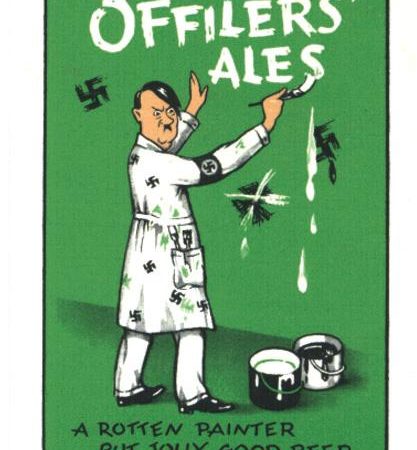Adolf Hitler and scantily-clad women are hardly the words you’d expect to read at the start of an article about brewery playing cards.
Yet Hitler is depicted in a card issued during World War Two with a derogatory reference to his past life as an artist. Strange to think that had Hitler won the war, the author of a humorous brewery playing card could have faced a dark fate. As for the scantily-clad women, well they have appeared in all kinds of advertising through the ages and brewery playing cards are just another form of advertising.
Breweries began issuing playing cards around the start of the 20th Century when games such as cribbage and bridge were popular in pubs. They were the forerunners of pool, darts and watching satellite television.
Certain card games such as cribbage were actually mentioned in various licensing acts as the only games to be played in pubs on which a wager was permitted.
Only bets of ‘small amounts’ were allowed, although no definition of ‘small’ was offered. Quite amazingly, hefty sentences were meted out to working men of Victorian times for placing farthing bets on cribbage before it was exempted from anti-gambling laws, along with dominoes. For the brewers, making playing cards and giving them to pubs was a cheap way to put images of their beer in front of the pub drinker.They became collectors’ items because the brewers only issued about 20 cards a year, compared to the thousands that were issued by cigarette companies.
Because fewer people play cards in pubs these days – and that’s an understatement – breweries no longer have any reason to issue them. This also makes the cards interesting to collectors. Another factor in their scarcity is the declining number of brewers. Guinness still issues them, however, as do Wolverhampton & Dudley, Greene King, Hardy & Hansons.
Guinness produces about 80 packs over time, featuring more than 120 different designs. A useful site for card-hunters is www.cartamundi.com, where details of card fairs and various products can be found.
Despite their scarcity, the cards attract little commercial value. The British Brewery Playing Card Society advertises its most expensive cards for around £3, and the cheapest can be had for as little as 20p.
Organiser Mike Johnson says the prices keep the agents and professionals out and allow everyone the chance to join in.
Society members number around 100 and are based all over the world but mostly in England. However, the origin of brewery playing cards is thought to be in a Belgian town near Antwerp, which should come as no surprise given the Belgian sense of humour and penchant for beer. It was while in Belgium that Mike Johnson and a few friends hit upon the idea of forming the society in 1992.
He says: “We found that people collected them and decided to give it a go ourselves. Some of our members are in Belgium.
“As far as we know, no-one had started collecting brewery playing cards before we did. Collecting single cards was certainly unheard of. Each of the society’s members acts as a ‘spotter’. If a card is seen behind the bar or on the wall in a pub, this is reported to one of the organisers, who writes to the relevant brewery.
“We ask if they can sell us the cards. They are usually kind enough to just send us some.”
Members meet regularly and a British delegation attends meetings of the Belgian membership about 10 times a year, possibly placing a slight strain on the wealth, and, we dare say, health of those involved.
Older cards are more difficult to come by, as might be expected. “We try to find them through the internet,” says Mike.
Nevertheless, partly thanks to the society, the job is made easier by bringing collectors together through a quarterly newsletter, which, as well as acting as a sales forum, runs articles about beers and pubs.
Overseas brewers such as Heineken and Budweiser also make cards. This was of little interest to the UK society until recently. “We decided to diversify,” said Mike. Some members also show an interest in cigarette cards, but that’s a different kettle of fish.
Interestingly, given the origins of their hobby, card collectors rarely play.
Mike was unable to explain this, but possibly it’s because tossing the cards over a beer-stained table might not do them any good.
Article is from Beers of the World Magazine Issue 4

